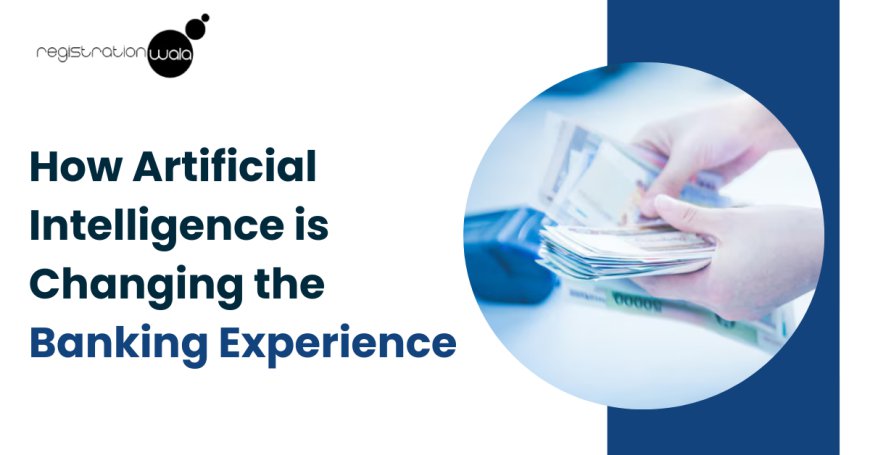How Artificial Intelligence is Changing the Banking Experience

Artificial Intelligence (AI) has emerged as a game-changer in several industries, and banking is no exception. With its ability to process large volumes of data, make real-time decisions, and predict future outcomes, AI is transforming the way banking services are delivered. From customer service to fraud detection, AI is improving the banking experience for both consumers and financial institutions. In this article, we will explore how AI is reshaping the banking sector and what it means for the future of banking.
AI in Customer Service: Enhancing User Experience
One of the most visible impacts of AI in banking is in customer service. Traditional banking operations required human agents to respond to customer inquiries, often leading to long waiting times and inconsistent responses. AI-powered chatbots and virtual assistants are now helping banks provide faster and more accurate customer support.
Chatbots: The Future of Banking Conversations
AI-powered chatbots are capable of handling a wide range of customer queries, from simple balance inquiries to complex transaction requests. These chatbots are available 24/7, offering customers quick responses at any time of the day. The integration of natural language processing (NLP) allows chatbots to understand and respond to customer questions in a conversational tone, making the banking experience more intuitive and user-friendly.
Virtual Assistants: Personalized Financial Guidance
AI-driven virtual assistants are transforming the way customers manage their finances. These assistants can provide personalized financial advice based on the user’s spending habits, saving goals, and credit history. They can also send reminders for bill payments, suggest investment opportunities, and even assist in budgeting.
AI in Fraud Detection and Security
The security of financial transactions is a top priority for banks, and AI is playing a crucial role in enhancing security measures. Traditional security methods, such as password protection and PINs, are vulnerable to cyber-attacks. AI, on the other hand, uses advanced machine learning algorithms to detect unusual patterns in real-time, preventing fraudulent activities.
Machine Learning: Detecting Fraudulent Transactions
Machine learning algorithms can analyze transaction data in real-time to detect anomalies that may indicate fraudulent activity. For instance, if a customer makes an unusually large withdrawal from a foreign location, the AI system can flag the transaction for further verification. This ability to monitor transactions in real-time significantly reduces the risk of fraud and enhances the overall security of banking systems.
Biometric Authentication: A New Era of Security
Biometric authentication, such as fingerprint scanning, facial recognition, and voice recognition, is becoming increasingly popular in banking. AI systems are capable of recognizing biometric data with a high degree of accuracy, providing customers with a more secure and convenient way to access their accounts. This level of security is critical in preventing identity theft and unauthorized access to sensitive information.
AI in Loan Processing and Credit Scoring
AI is also making significant strides in the lending process. Traditional loan applications are often time-consuming and require customers to submit numerous documents. AI simplifies this process by automating document verification, credit scoring, and risk assessment.
Automation of Loan Approval Process
AI-driven systems can quickly analyze a customer's financial history, including income, expenses, and credit score, to assess the likelihood of loan repayment. By automating the loan approval process, banks can provide faster decisions, reducing the time and effort involved for both customers and financial institutions. This also helps in offering more personalized loan products tailored to the customer's financial profile.
Improved Credit Scoring with AI
AI is also enhancing credit scoring models by considering a wider range of factors beyond traditional credit history. Machine learning algorithms can assess alternative data sources, such as social media activity and spending patterns, to create a more accurate picture of a customer's creditworthiness. This can be particularly beneficial for individuals with limited or no credit history, helping them access financial products they may have been previously denied.
AI and NBFC Registration: Streamlining Financial Services
In addition to traditional banks, Non-Banking Financial Companies (NBFCs) are also embracing AI to enhance their services. AI can help NBFCs streamline the NBFC registration process, automate compliance checks, and enhance customer interactions. By integrating AI into their operations, NBFCs can reduce operational costs, improve customer satisfaction, and offer more personalized financial products.
AI in Regulatory Compliance for NBFCs
AI-powered tools can assist NBFCs in complying with regulatory requirements by automating tasks such as KYC (Know Your Customer) checks, AML (Anti-Money Laundering) procedures, and transaction monitoring. This reduces human error and ensures that NBFCs adhere to industry standards and regulations more efficiently.
Conclusion: The Future of Banking with AI
Artificial Intelligence is revolutionizing the banking sector by enhancing customer service, improving security, automating loan processing, and enabling more accurate credit scoring. The integration of AI into banking systems allows for more personalized services and more efficient operations, benefiting both consumers and financial institutions. As AI continues to evolve, we can expect even greater advancements in the way banking services are delivered. For emerging financial institutions like NBFC license cost, embracing AI can unlock new opportunities for growth and innovation.
